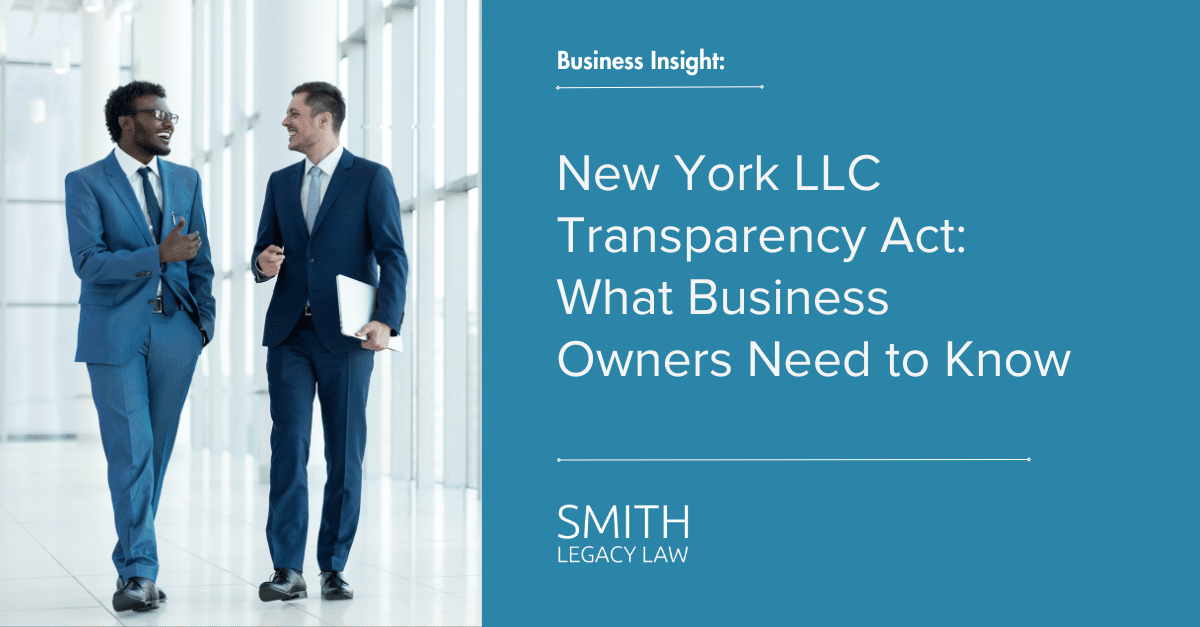On December 22, 2023, the New York LLC Transparency Act (NYLTA) was enacted, in many ways mirroring the federal Corporate Transparency Act (CTA) also passed in 2023. Both laws require businesses to disclose “beneficial ownership” information to help combat money laundering, tax fraud, and other crimes. However, there are several important differences that businesses should understand to ensure compliance with the laws.
Who Must File a Disclosure Under the NYLTA?
“Reporting companies” must file a disclosure with the New York Department of State. The NYLTA uses the same definition of reporting company as the CTA. However, the NYLTA only applies to domestic LLCs formed in New York and foreign LLCs authorized to do business in New York. [link to The Corporate Transparency Act: What Every Business Needs to Know About It]
Some exceptions exist under the law. An LLC exempt from filing under the CTA is also not required to file under the NYLTA. However, a member or manager of the LLC must file a signed statement indicating which provision in the law they are relying on in claiming an exemption.
What Information Must a Reporting Company Provide?
In New York, reporting companies must provide the full legal name, date of birth, current business street address, and unique identifying number (from an acceptable document as specified by the CTA) for each beneficial owner. LLCs can submit the same form they use for the CTA.
A “beneficial owner” is defined as a person with at least 25% ownership/control interest or substantial control of the business.
When Do Reporting Companies Have to Comply with the NYLTA?
The law goes into effect December 21, 2024. LLCs formed or authorized to do business in New York prior to the effective date must file their disclosure or exemption statement by January 1, 2025. After the effective date, LLCs must file their disclosure at the time they file their articles of organization or application for authority.
Changes to any information required to be disclosed must be filed within 90 days of the change.
Where Are the Disclosures Filed?
Under the CTA, businesses must file with the Financial Crimes Enforcement Network (FinCEN). However, the NYLTA provides that LLCs formed or authorized to do business in New York must file with the New York Department of State. Domestic LLCs may submit their initial FinCEN report if it contains the information required by the NYLTA. Foreign LLCs must submit their initial FinCEN report if it contains the required information.
What Are the Penalties for Non-Compliance?
If the disclosure is not filed, after 30 days the Department of State’s records will show the LLC is past due or delinquent until the disclosure is filed. After two years, a civil penalty of $250 may be imposed.
Who Has Access to Beneficial Ownership Information?
The NYLTA indicates that the information will be publicly available in a database maintained by the Secretary of State. Only the full legal names of beneficial owners will be provided. Other personal information will be confidential except for law enforcement or court orders. Beneficial owners can apply for a waiver for privacy interests.
How Do the CTA and NYLTA Compare?
The disclosure requirements and definitions are much the same in the two laws. However, the NYLTA only applies to LLCs formed or registered in New York and LLCs must file with the Department of State, not FinCEN. Also, to obtain an exemption in New York, a signed statement must be submitted. That is not a requirement under the CTA.
Under the CTA, only the government will have access to the beneficial ownership information. In New York, it will be public.
Penalties are less severe in New York for noncompliance. A civil penalty of $250 may be imposed but no jail time. The CTA provides for a maximum civil penalty of $500 per day up to $10,000 and a criminal penalty of imprisonment for up to two years.
What Are the Next Steps for Businesses?
LLCs must comply with the CTA and NYLTA by January 1, 2025. Accordingly, owners should review any entities that they have an interest in, determine whether they are required to comply, and submit the necessary documentation as needed. Owners may also want to consider terminating entities that are not needed to avoid possible reporting obligations.
If you need assistance with making these determinations and complying with the CTA or NYLTA, contact us for a consultation.
